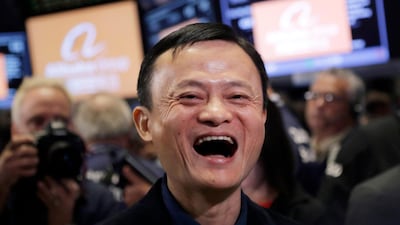Jack Ma, the billionaire co-founder of e-commerce platform Alibaba, recently provoked a backlash when he endorsed the gruelling work culture that has helped make him one of China's richest men. The so-called 996 routine – referring to the practice of working from 9am to 9pm, six days per week – is common among China's tech companies and start-ups – and, according to Mr Ma, a "huge blessing that many companies and employees do not have the opportunity to have".
He added: “We do not need those who comfortably work eight hours. If you do not do 996 when you are young, when will you?”
The response was fast and furious. A group of software developers who had taken to Microsoft-owned platform GitHub in March to protest against working conditions have since attracted support from more than 200,000 people.
Others have posted a blacklist of 150-plus companies that demand extra hours with little or no pay. And one person tweeted: “Go to bed at 9. Sleep 9 hours. Wake up at 6. Work smarter not harder.”
In jobs where the bulk of our labour is cognitive, the question of how many hours you work is not always an easy question to answer. We might, for example, spend eight hours in an office but then spend considerably more time thinking about work while commuting. Some of us might also find ourselves checking business emails on smartphones or tablets at the dinner table, spend our evenings either fretting about or planning our to-do list for the next day or chewing over conversations with colleagues. If that is not mentally exhausting enough, we also expend energy worrying about job security or spend endless hours wondering how best to get ahead.
Even when we are not talking shop, we are often thinking about it. Psychologically speaking, many of us are already straining under the pressures of a self-imposed 24/7 work schedule.
The health implications of overworking are manifold. Research suggests the longer your working hours, the greater the risk of health complaints, both physical and psychological, ranging from depression and heart failure to premature death.
This problem is particularly well documented in Japan, where karoshi means death from overwork. A white paper published by the Japanese government in 2016 suggested that one in five Japanese workers were at risk of death from overwork. The government has taken heed and this month, Japan’s new work reform law came into effect, limiting overtime to 45 hours per month.
Meanwhile a new global study of 13,000 workers by health insurance firm Cigna found as many as 88 per cent of women and 85 per cent of men found their jobs stressful. One in 10 found the level of stress "unmanageable". In the UAE, nearly half of all workers said they struggled to cope with their workloads.
We cannot, however, enforce proper work practices through legislation. Even if we had a strict nine-to-five workday policy, some of us would still fail to clock off in our heads. Some employees absolutely love what they do; they are energised by their work and passionate in their pursuit of perfection, but they are in the minority.
For this reason, optimum working hours cannot always be neatly articulated as a static, one-size fits all set of numbers. The question is not how many hours we should or should not work but rather, how good are we at switching off? In the words of the distinguished scientist John Teasdale, how skilfully can we shift from “doing mode” into “being mode”?
Doing mode is associated with narrowly focused attention and goal-directed activity. It’s all about changing, fixing and closing the gap between how things are, versus how we wish things to be. Doing mode is obviously very useful but occasionally it is met with problems which cannot be fixed or overcome. This can give rise to feelings of stress, especially if we remain stuck in doing mode.
It is not necessarily long hours that are harmful to our wellbeing; it is stress and the way we react to it that can lead to significant problems. If we are habitually in doing mode, we end up taking problems home and trying to resolve everything in one night, even things that do not have a quick fix. That can have an impact on our health and our relationships. Unsurprisingly, psychologists have found that this mode is associated with depression.
Being mode, on the other hand, is not focused on achieving any specific goal or trying to change things. In this mode, our attention is more broadly focused and open to noticing things, accepting them as they are with a sense of interest, curiosity or wonder. This is the state we might experience while gazing out across a beautiful landscape, for example. It is also a state that is cultivated in mindfulness meditation as a way of managing stress and overcoming depression, as well as sparking creativity and innovation.
For many employees, however, the real issue is the inability to let go of work-related issues when the day is done. If we want to improve employee wellbeing, innovation, resilience and productivity, then introducing workplace mindfulness programmes is far more effective than insisting on presenteeism.
Justin Thomas is a professor of psychology at Zayed University



